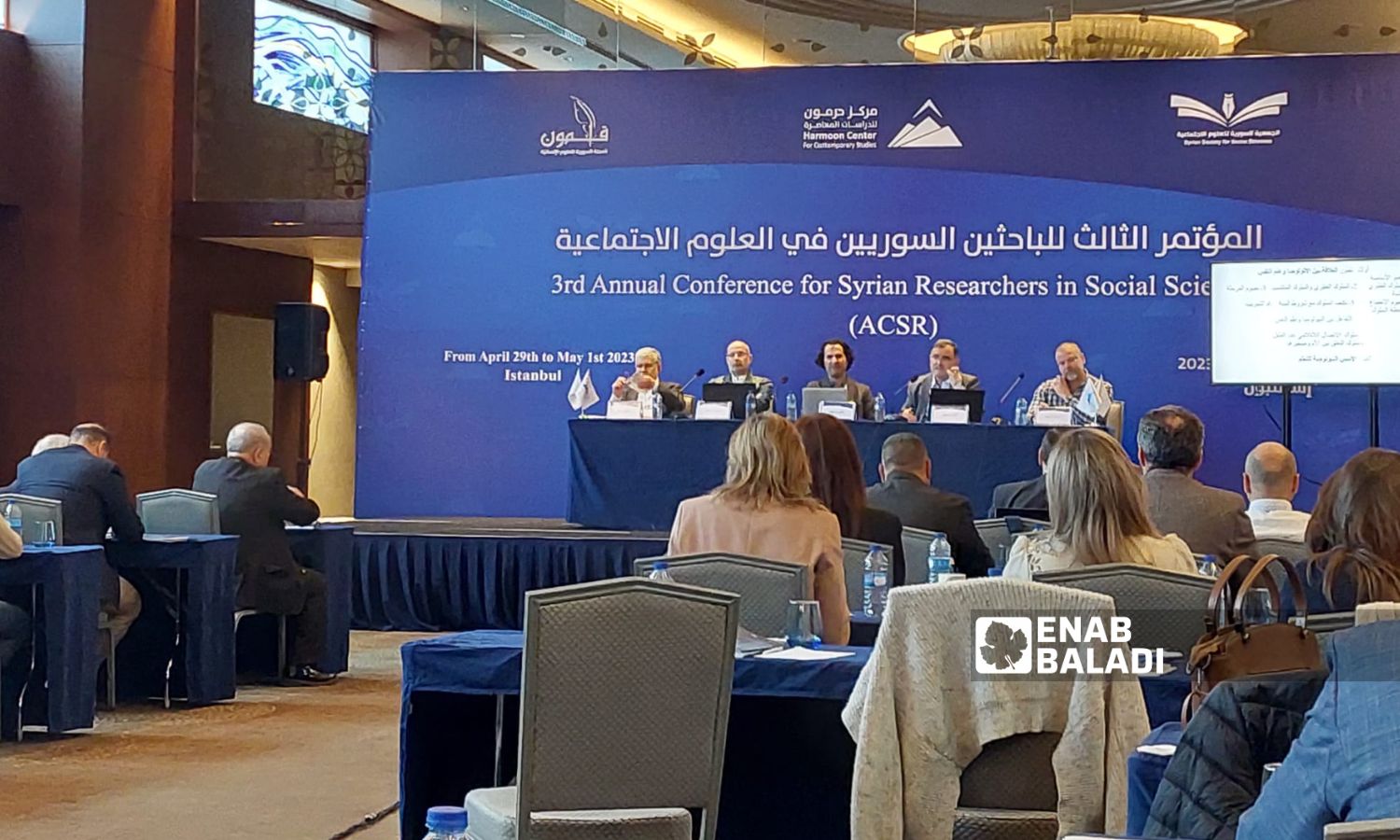



Enab Baladi – Jana al-Issa
In a situation that has not changed much in more than 30 years, the Syrian regime has dominated the business sector and has complete control over its wealth creation and business management.
After 2011, the domination of the sector increased, and most of the active businessmen disappeared, either by reducing the size of their business to a minimum or by rebuilding capital outside Syria.
The role of the business sector in society and its accountability is linked to the role of the state, as states grant the business sector its rights and privileges by adopting various policies and legal decisions and setting legislative frameworks in a way that affects the size of its business and the extent of its independence from it.
Within the third conference of Syrian researchers in social sciences on April 29-30, which was attended by Enab Baladi, Jamal Mansour, a Syrian researcher who is a doctoral candidate in political science at the University of Toronto, discussed a research study entitled “The Relationship between the Business Sector and Power in Syria – Between Independence and Subordination.”
The study aims to answer a personal question of the researcher specialized in comparative politics about the “ambiguous” position taken by a group of those belonging to the business sector class in Syria at the start of the Syrian revolution.
Mansour divided the Syrian business sector within the research paper into three categories, in terms of location first, between the industry sector on the one hand and trade on the other hand, and finally, in terms of the volume of trade or industry, i.e., between large and medium capitals.
The study seeks to compare these groups on two levels. The first is geographical and includes the business class in Damascus and Aleppo, given that they are the two economically largest cities in Syria.
It included only the business sectors whose source of funds is independent of the authority, meaning that the source is not the businessman’s political affiliation.
While the second is the temporal level that includes two periods in one country between the father and son (Hafez and Bashar al-Assad) regimes and covers the time period after 1990 when the investment law was issued as the formal and not the actual beginning of the state’s withdrawal from carrying out its economic functions and allowing the private sector to slowly fill the state’s voids which the state controlled by itself.
Then the second era, from 2000 to 2011, was when Bashar al-Assad came to power before the eruption of the Syrian revolution.
The researcher defined the independence of businessmen from the authority as “independence in order to” and “independence from.” The first expresses the ability of the businessmen to carry out their work at the economic, social, political, philanthropic levels, and so on, while the second is the businessmen’s protection of themselves against the seizure of their money and sectors of work.
Through 50 research interviews, Mansour said the business sector in the period covered by the research used many strategies to maintain the independence of its men.
One of these strategies is the choice of many businessmen to disperse their business through several companies that may not necessarily be registered in their name so as not to draw the state’s attention to the real size of their trade and thus covet them.
The importance of the business sector’s independence from power in general, not only in Syria, is due to the fact that society’s relationship with the state must be balanced.
Researcher Mansour believes that one of the problems of the relationship between the authority and society in Syria is the lack of balance and the complete bias of the balance of power in favor of the authority that is involved in all the actions and areas of society.
“This does not leave society any possibility of free work, in which it may demand rights to push the authority’s domination over it,” he adds.
Mansour revealed to Enab Baladi on the sidelines of the Harmoon Center’s conference that the business sector in Syria is one of the sectors that lost a large part of its capabilities during the period of the Baath Party’s rule in general and the period of the rule of al-Assad, father and son, in particular.
Mansour said that his study aims to examine the impact of the authority’s dominance on the business sector and the compelling of businessmen to search for small spaces for independence.
He added that the aim of the research agenda beyond that is to try to think about the idea of “how can we, as societies and as social sectors, including the business sector, enlarge these spaces, and adopting effective strategies for that, or spreading it to other sectors,” so as to increase the areas of independence in society.

The head of the Syrian regime, Bashar al-Assad, next to businessman Badih al-Droubi during the opening of the solar power plant in Adra Industrial City east of Damascus – September 2022 (Syrian Presidency)
Mansour’s study included the period between 1990 and 2011 only and was about the level of independence between the business sector and the authority after the outbreak of the Syrian revolution.
The researcher said that there is no business sector far from the dominance of the authority today in Syria, as most of the businessmen who were active until 2011 have disappeared today, either by reducing the size of their business to a minimum or by rebuilding capital outside Syria by some of them.
And after 2011, the business sector cannot be considered independent of the will of the authority and its full interference in making its wealth, managing its business, and dominating it, according to Mansour.
The impact of the lack of independence in the business sector is currently represented by the sluggish performance of the Syrian economy, the inability of the private sector to work, and the absence of production, which is also linked to the absence of infrastructure and the absence of the human sector, because a large part of the labor force is currently semi-skilled.
Also among the factors is the disappearance of skilled labor abroad, in addition to the weakness of the market due to the absence of the possibilities of a consumer market due to the weakness of purchasing power.
Mansour believes that part of the absence of independence today between the business sector and the authority in Syria is a reflection of the current reality on the one hand and a reflection of the complete absence of the business sector compared to before 2011.
The existence of a business sector that is independent of the authority is almost impossible, given the current circumstances.
However, the desire of some of those who emigrated after 2011 to return to Syria for several reasons may have a role in the re-emergence of an independent sector, but with conditions.
Researcher Mansour said that through his meetings during the preparation of the study with people associated with the business sector in Syria before 2011, who numbered about 50 people, most of them had the feeling that their labor market and their main presence is in Syria,
Some of them had an emotional attachment to the country or economic interest, and some of them had a family legacy and felt the responsibility of completing this economic legacy.
This feeling, for all its reasons, is considered a sufficient justification for the return, but it is a conditional return with signs of a reasonable settlement in Syria and a return that may not be complete and sufficient for the businessman to completely leave the business that he established during the past 12 years, but at least the return of part of his investments may be an issue. It may be considered an attractive factor for other investors.
if you think the article contain wrong information or you have additional details Send Correction